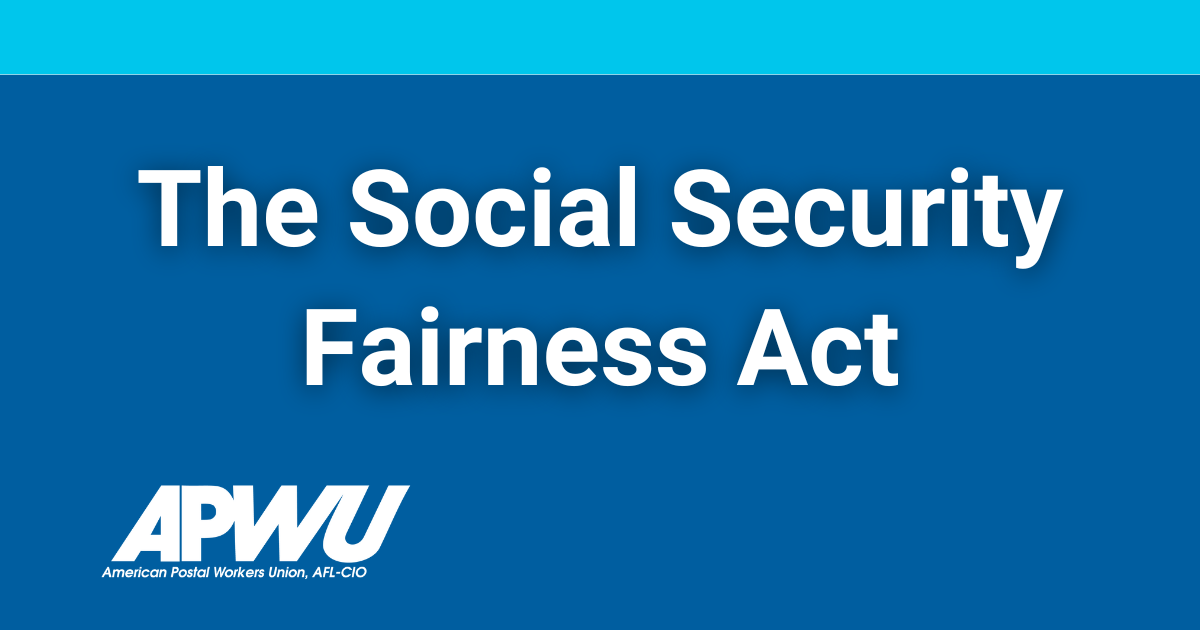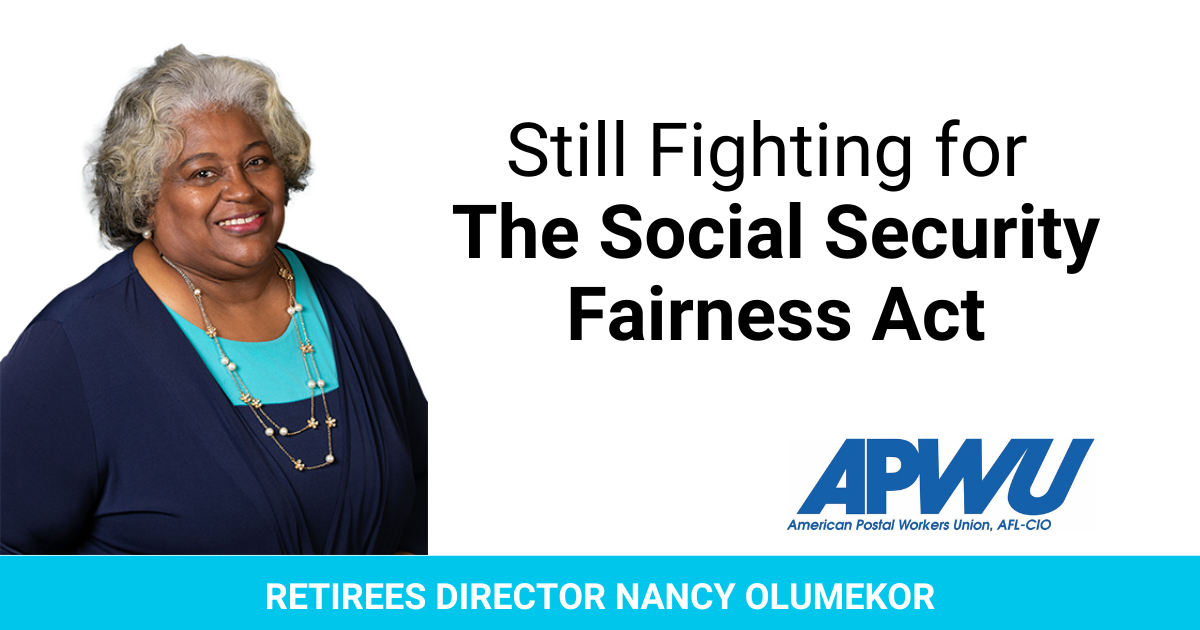CWA Statement Regarding Passage of the Social Security Fairness Act offers a comprehensive analysis of this significant legislation. The Communication Workers of America (CWA) has weighed in on the act’s passage, outlining its potential impact on members’ retirement benefits and the broader implications for Social Security reform. This statement provides crucial insight into the CWA’s advocacy efforts, its perspective on ongoing debates, and projections for the future of retirement security.
The statement details the CWA’s official position, including key arguments and specific provisions addressed. It also analyzes the potential effects on CWA members, categorized by positive, negative, and neutral impacts, offering illustrative scenarios. Furthermore, the CWA’s advocacy efforts leading up to the act’s passage, including lobbying strategies and engagement with lawmakers, are thoroughly documented. Finally, the statement places the act within the larger context of Social Security reform, comparing the CWA’s viewpoint with others and projecting long-term consequences.
CWA’s Stance on the Social Security Fairness Act

The Communication Workers of America (CWA) issued a statement following the passage of the Social Security Fairness Act, outlining its position on the legislation and its potential impact on its members. This analysis details the CWA’s official position, its advocacy efforts, and the broader implications of the act within the context of ongoing Social Security reform debates.
CWA’s Official Position, CWA Statement Regarding Passage of the Social Security Fairness
The CWA’s statement expressed strong support for the Social Security Fairness Act, emphasizing its potential to improve the retirement security of its members. The key arguments centered on the elimination of discriminatory provisions that negatively impacted certain groups of workers, particularly those who had worked in multiple jobs or had experienced periods of unemployment. The CWA specifically addressed provisions that corrected inequities in benefit calculations for individuals who had worked in jobs not covered by Social Security or who had experienced periods of low earnings due to factors such as caregiving responsibilities.
While the statement didn’t explicitly compare its stance to other major labor organizations, it implied an alignment with organizations advocating for similar social security improvements. The CWA highlighted the fairness and equity aspects of the legislation as central to its support.
Impact on CWA Members
The Social Security Fairness Act is projected to have a predominantly positive impact on CWA members’ retirement benefits. This will primarily benefit those who experienced career interruptions or worked in multiple jobs with varying levels of Social Security coverage. The act’s impact on financial security will vary based on individual circumstances. For example, a CWA member who took time off to care for a family member might see a significant increase in their retirement benefits.
The CWA’s statement celebrating the passage of the Social Security Fairness Act highlights a significant victory for retirees. This positive development comes amidst ongoing budgetary challenges in Washington, as evidenced by the recent news that the US Senate approved a government funding extension after failing to reach a broader agreement, as reported here: US Senate approves government funding extension after failing to.
The contrast underscores the importance of focused legislative action, even while broader fiscal debates continue to unfold. This successful Social Security reform demonstrates the power of targeted advocacy.
| Impact Category | Specific Impact | Affected Member Group | Example Scenario |
|---|---|---|---|
| Positive | Increased retirement benefits | Members with career interruptions | A member who took 5 years off to raise children receives a higher benefit reflecting their full career earnings. |
| Positive | More accurate benefit calculation | Members with inconsistent work history | A member who worked part-time and full-time jobs over their career sees their benefits more accurately reflect their total earnings. |
| Neutral | No significant change | Members with consistent, high earnings | A member with a steady career path might see minimal changes in their benefits. |
| Negative | (Potentially) Minor administrative delays | All members | A short-term delay in processing benefit recalculations. |
CWA’s Advocacy Efforts
The CWA’s advocacy for the Social Security Fairness Act involved extensive lobbying efforts, direct communication with lawmakers, and public awareness campaigns. The union engaged in direct lobbying with members of Congress, emphasizing the act’s importance for its members’ retirement security. They utilized various communication channels to inform members and the public about the legislation’s provisions and its potential impact.
The CWA’s engagement with lawmakers included testimony before congressional committees, meetings with individual legislators, and coalition-building with other organizations supporting the act. These efforts contributed significantly to building support for the legislation and shaping public opinion in its favor.
Broader Context of Social Security Reform

The CWA’s statement on the Social Security Fairness Act fits within the broader context of ongoing debates about Social Security’s long-term solvency and benefit adequacy. The CWA’s perspective aligns with those advocating for strengthening and expanding Social Security benefits to ensure a secure retirement for all workers. This contrasts with viewpoints that prioritize cost-cutting measures or privatization. Key challenges include maintaining the system’s financial stability while addressing rising healthcare costs and increasing life expectancies.
Opportunities exist for bipartisan collaboration to find sustainable solutions that protect benefits for future generations.
- Arguments for the Social Security Fairness Act: Improves fairness and equity in benefit calculations; addresses historical inequities; enhances retirement security for vulnerable groups; aligns with CWA’s commitment to worker well-being.
- Arguments against the Social Security Fairness Act: Potential for increased costs; concerns about long-term solvency; (These are generally arguments against Social Security expansion, not specific to this act, and CWA likely did not address these directly in their statement supporting the act.)
Future Implications

The long-term consequences of the Social Security Fairness Act, based on the CWA’s analysis, are expected to be largely positive. The act is likely to influence future CWA advocacy efforts by setting a precedent for addressing inequities in the Social Security system. This might lead to further advocacy for legislation aimed at expanding benefits or strengthening protections for vulnerable workers.
The act’s success could encourage future legislative efforts to improve retirement security and address the challenges facing Social Security in the coming years. A potential future legislative challenge might involve addressing the system’s long-term funding stability. In response, the CWA might advocate for solutions that protect benefits while ensuring the system’s sustainability, possibly through progressive tax reforms or adjustments to the retirement age, while still prioritizing fairness and equity for all workers.
In conclusion, the CWA Statement Regarding Passage of the Social Security Fairness Act presents a detailed and nuanced perspective on this pivotal legislation. By examining the potential impacts on its members, outlining its advocacy efforts, and situating the act within the broader context of Social Security reform, the CWA provides valuable insight into the ongoing debate surrounding retirement security. The statement’s comprehensive analysis serves as a crucial resource for understanding the complexities of this legislation and its potential long-term implications.
Popular Questions: CWA Statement Regarding Passage Of The Social Security Fairness
What specific benefits are affected by the Social Security Fairness Act?
The act primarily affects benefits for those who have paid into Social Security for a significant period but may have experienced periods of lower or no earnings, such as those who took time off for caregiving responsibilities or faced periods of unemployment.
How does the CWA’s stance compare to other labor organizations?
The CWA’s statement applauds the passage of the Social Security Fairness Act, a significant victory for impacted workers. This positive development contrasts sharply with the less celebratory atmosphere surrounding the recent football match, as seen in the Brentford 0-2 Nottingham Forest: Ola Aina and Anthony Elanga end report. Ultimately, both events highlight the importance of fair outcomes, whether in legislative matters or on the football pitch.
The CWA will continue advocating for social justice.
This requires further research to provide a precise comparison. The statement itself may provide some insight into the CWA’s position relative to other groups but a full comparative analysis would necessitate reviewing statements from other organizations.
What are the potential long-term financial implications for the Social Security system as a whole?
The long-term financial impact is a complex issue requiring actuarial analysis. The CWA statement may offer some projections, but a definitive answer would necessitate reviewing independent financial analyses of the act.
